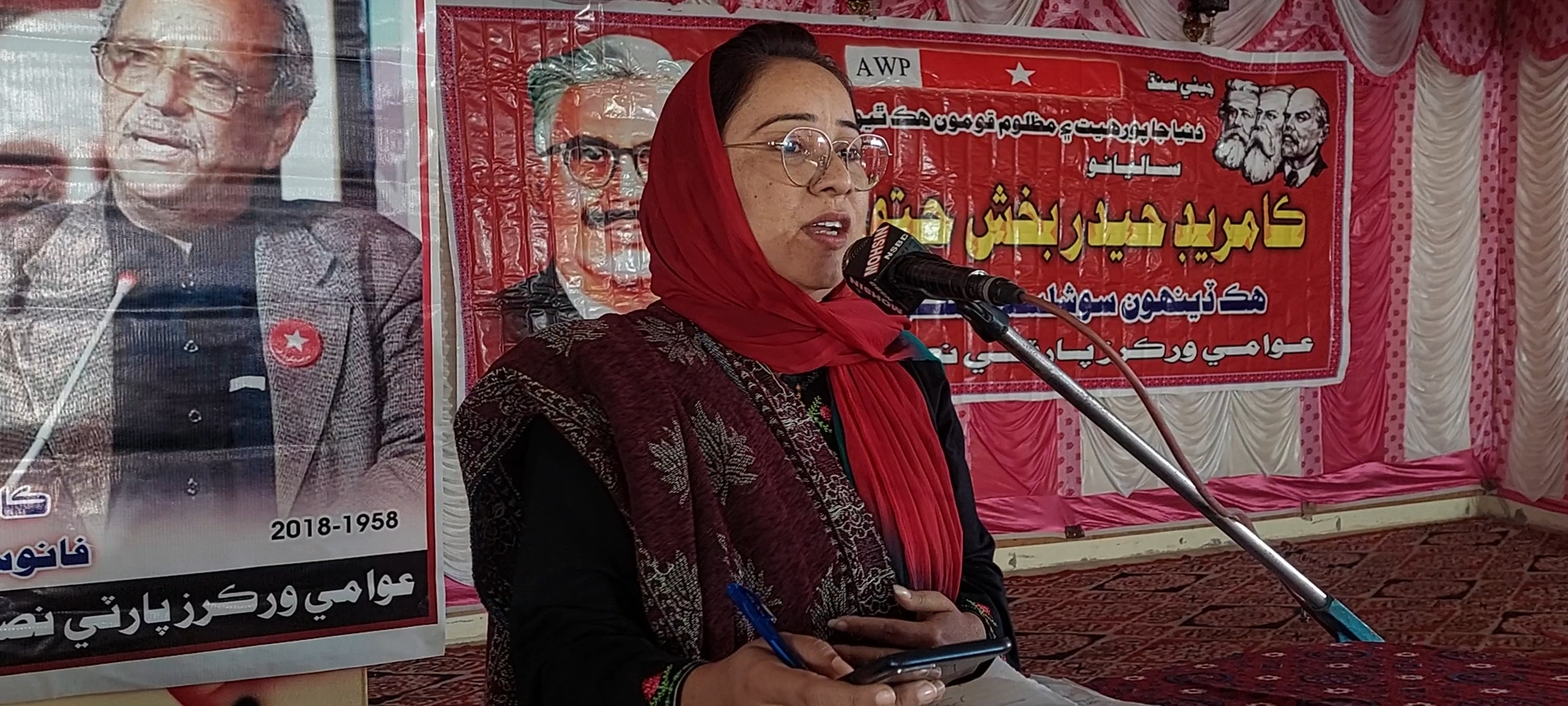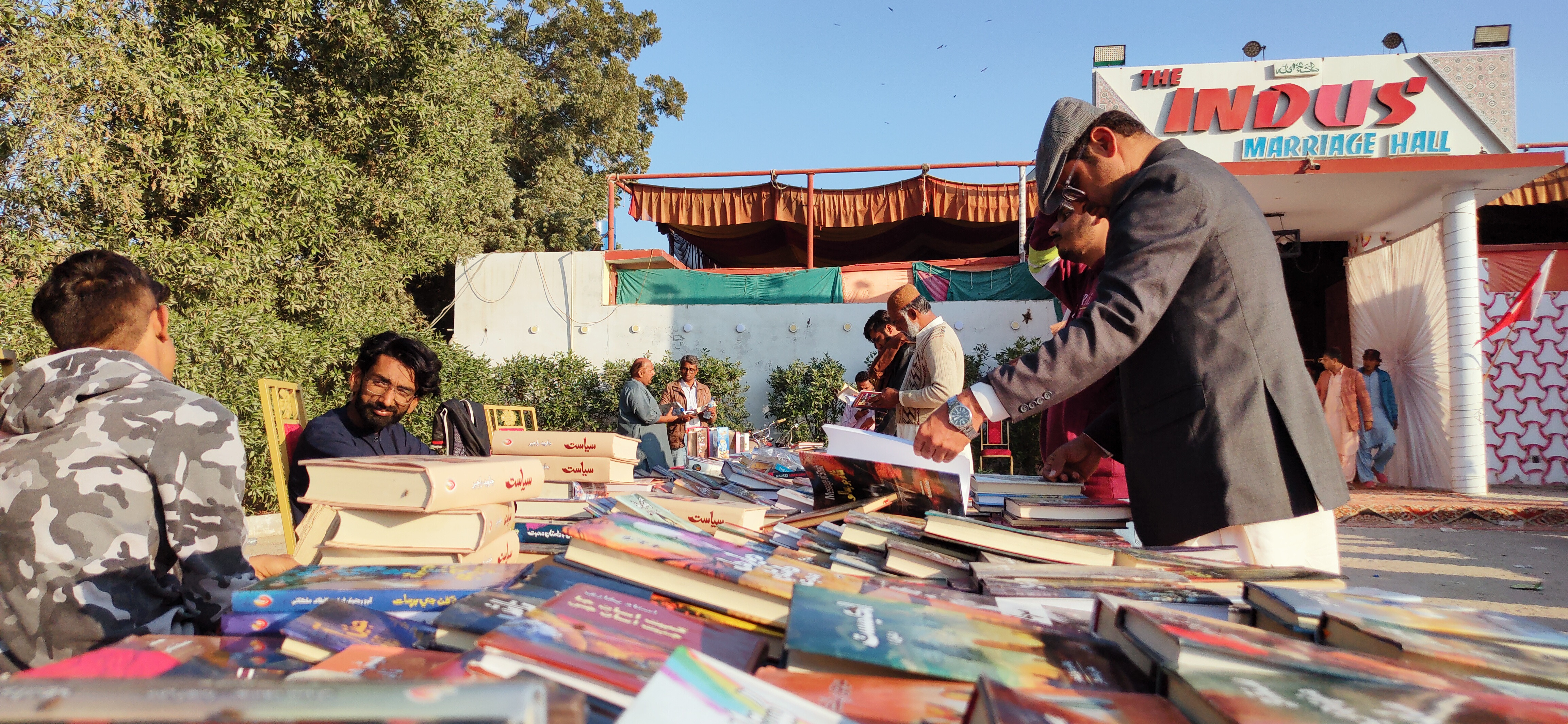It may come as a surprise that an intellectual and rather cerebral activity is taking place in a backward and conservative area of interior Sindh. In Naseerabad tehsil, Qamber, Shahdadkot district, a wedding hall is decorated with red flags. An energetic audience of several hundred people attentively listens to Fatima Majeed, a resident of Karachi’s coastal area of Ibrahim Hyderi, as she laments on stage about the displaced fishermen of her area who lost their livelihoods as the result of the Indus Delta destruction.
People outside the hall are busy browsing at bookstalls, while others are posing for selfies with portraits that adorn the walls of the hall. These portraits are of Hyder Bux Jatoi and other revolutionaries including Sobhu Gianchandani, Karl Marx, Lenin, and Stalin.
First organised in 2017, this annual event known as Hyder Bux Jatoi Socialist School is named after Hyder Bux Jatoi, a revolutionary, leftist and peasant leader, who left his government job as a deputy collector in 1945 to devote all his time to the farmers’ plight.
Jatoi kicked off a class war for the rights of the peasants and labourers by joining the Sindh Hari Committee, which he headed till 1970. He pioneered the slogan ‘Hari Haqdaar’ and based on the same motto, he also started Sindhi and English dailies.
The school is organised through donations by local activists, farmers, labourers, and citizens, and supported by the Awami Workers Party to pay tribute to the peasant leader. They believe that such schools are an important step to facilitiate and promote intellectual thinking.
It is modelled on the 19th century Socialist Sunday Schools in Great Britain which arose in response to a widespread feeling as to the inadequacy of the orthodox Sunday Schools as a training ground for the children of Socialists. The purpose of the socialist schools was to supply the socialist movement with fearless, capable and conscientious thinkers.
The Naseerabad ‘school’ aims to highlight the problems of the working class and the sessions include discussions on topics such as farmers’ rights, feudalism and capitalism, empowering women in politics, indigenous communities’ displacement, and the struggle of oppressed people.
1674984175-1/IMG-20230102-WA0068-(1)1674984175-1.jpg)
This year, the theme was climate change as Sindh had borne the brunt of excessive rains and catastrophic floods. Fatima Majeed in her session ‘Encroachment, climate crisis and the coastal belt of Sindh’ put forward the case of fishermen and the destruction of the Indus Delta.
“Out of four million fishermen, two million fish in brackish water, and the rest in fresh water,” says Majeed. “By stopping the natural flow of the river, freshwater does not flow into the sea, and a large number of people have lost employment. Once we used to be prosperous, but we are now poor, and our livelihoods are fast disappearing due to the effects of climate change, dams and coal projects on the river. On the other hand, the Indus Delta is being destroyed as 4.2 million acres of land and hundreds of islands have been swallowed by the sea.”
She believes that development should not be at the cost of destruction of lives and livelihood of the fisher folk. “For instance, earlier, the Gizri area near Clifton, in Karachi, used to be a fishermen’s settlement,” says Majeed. “Now these fishermen have become prisoners of DHA.”
Speaking on floods in Pakistan and Sindh, Ibrahim, a freelance journalist from the Kachho area of Sindh, bordering Balochistan, pointed out that after 2010, the state has not formulated a strategy for flood prevention. He is concerned that perhaps, that is the reason why, in 2022, people lost their homes in the floods and were left helpless without rescue, relief, and rehabilitation.
“I am a flood affectee and had to evacuate my family and other people from the village,” he says. “Even after such a catastrophe, the seriousness of the government institutions has not come to light.”

In the third session on climate change its effects on South Asia and Sindh, Bakhshal Thalho, the General Secretary of Awami Workers Party reiterated how the world has become vulnerable to climate change and environmental disasters. “There have been major environmental changes in the US, China, and India,” says Thalho. “The ocean gave birth to life, and now it is dying due to the environmental changes caused as a result of capitalism. The rainfall was definitely more than the past, but we drowned because of the failures of the state. The environment issue is one that directly relates to the subjugated. It is high time, that we stand together to raise environmental, gender, national, and class issues that affect us.”
The ‘school’ began with the Urdu version of the the Internationale, [an anthem sung by communist and socialist groups round the world] resounding on speakers. Originally in French, it has been translated into many languages.
The audience was moved when Fozia Seengar, leader of the Women Democratic Front (WDF), song about flood-affectees. A grass-root political worker, who works for the inclusion of women in politics, Seengar contested in the local bodies elections held in June, last year. She has inspired many women to take part in politics and work for the rights of women.
Seengar believes that since half of the country’s population comprises women, it is not possible to conduct politics with just one half of the population. “So we have established WDF to work for women’s rights in the country and to end the patriarchal system,” she says.
Seengar Noonari, another grass-root worker in this area was abducted in 2021. He was released after the 35 days of continuous protests by his wife and other local activists.

Noonari who is among the organisers of the school, says that the masses are stuck in busy, chaotic lives and battling all kinds of socio-economic problems, and the school provides an alternative voice that when the need arises in the future could take the form of resistance.
“Most of the interior Sindh is a domain of feudal lords,” says Noonari. “So we have to be intellectually strong to end feudalism and oppression.”
Qambar-Shahdadkot is considered a stronghold of feudalism, and there are many problems faced by women and the lower-classes living here. “One might think that it is difficult for women to have a voice here, but the reality is even worse,” says Noonari. “They are hardly allowed to live as human beings. We are trying to change mindsets and push women into people’s politics so they can work for their rights. Since this was the sixth school, and the interest and seriousness of people is growing and it inspires us to organise such schools in other cities too.”
This school does not only have lectures and speeches, but revolutionary music is also an integral part of it.
“Music and theater are also a form of resistance, through which we can convey our message to the public,” says Noonari. “Hence music and art are included in every programme. This year Sindh’s famous singer Waqar Mallah sang songs about Sindh’s love and revolution.”
In the schools organised previously, Lal Hartaal a theater group from Islamabad presented a play on the oppression of women, while Dara Shikoh was presented by director Sadaf Thalho.
This time, since the theme of the theater were last year’s catastrophic floods. Interestingly, the actors performing in the theatre were flood victims and the audience was moved by their realistic performances, and the overwhelming audio effect, “It was not the rain, but the state that drowned us,” reverberated at the end of the play.
People from Karachi, Hyderabad, Larkana, and other cities all over the country attend this intriguing gathering. Those who cannot attend can listen to the sessions live on Facebook.
Regular participants of this school eagerly wait for it to be held and it has been commended by political and literary circles, and students from all over Sindh.
“I eagerly wait for this school to be held every year,” says Azad, a participating student from Hyderabad. “The lectures in this event are food for our minds, because it is a tremendous learning opportunity. Our interest is that these people speak for us, and highlight our problems and make us aware of our rights.”
Ali Ghulam, a student from Karachi University attends the school every year. “This school is very important for our intellectual development,” he says. “Although, literary festivals are held everywhere, but issues that belong to the common man are not highlighted or discussed as they are done here.”
“For instance, issues such as land-grabbing by influential people, the Thar coal project, and anti-people projects need to be exposed. In this forum, these issues are openly discussed. It is an alternative and original voice that all of us who are oppressed people desperately need. That is why I feel that I must attend this programme every year.”
Naji Channa, a government teacher is one of the organisers who feels that every year, more people are attending the school. “Earlier people were few, now we are surprised to see such a large number in attendance,” he says. “It is just a programme organised by common people, and the problems of common people are discussedat length.”
In the past, the schools have particularly focused on feminism and socialism. “The aim of this programme is to train the people in such a way that they themselves can strongly resist against all forms of oppression,” says Channa.
After the climate session, discussions on ideological politics, Marxism and its relevance in the present day, followed. The needs of people’s politics, and the Marxist perspective of the digital world was also discussed. It was emphasised that by being ideologically strong, societies can confront oppression and change for the better.
Heated discussions and debates were concluded with a music session. “Sahando ker miyar yaar, Sindhri te sir ker an dendo,” [No one will tolerate taunts, everyone will happily devote himself to the Sindh.] People swayed to the music and chanted revolutionary slogans, feeling rejuvenated and charged with a new resolve to face their everyday issues.
The writer is a Sindh-based independent multimedia journalist and can be reached at @RehmatTunio. All information and facts are the responsibility of the writer
